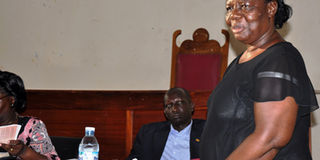MPs toughen on maternal deaths

Ms Florence Mutyabule, the chairperson Parliamentary Forum on Children. She presented before the House, a partial report on the death of Remmie Wamala Nanono, a senior Parliament employee, who died while giving birth. PHOTO BY monitor reporter.
What you need to know:
MPs have agreed to set up an ad hoc committee to inquire into the operations of private health service providers following the death of a senior Parliament employee.
Parliament this week stood up in the fight against maternal mortality. It resolved to set up an ad hoc committee to investigate private hospitals, and directed the government to conduct a study on the status of maternal health in the country.
The debate was provoked by the death of a senior Parliament employee, Remmie Wamala Nanono, who passed on under questionable circumstances. She was giving birth at the International Hospital Kampala (IHK).
According to family members, Wamala drove herself to IHK in the company of her mother to give birth to her fifth child, but did not live to see her baby boy. Her family narrated that she checked into hospital with intense labour pains, and following several hours of trying in vain, she asked to be operated on.
The hospital authorities, however, felt she should give birth naturally but later died after she bled ‘nonstop’, according to Ms Florence Mutyabule, the Woman MP for Namutumba.
Wamala’s close relatives say her death should have been avoided had the hospital authorities taken an urgent decision to operate her since her cervix had opened up to four centimetres, not wide enough to allow for normal delivery. Her Uterus, according to Ms Mutyabule, was ruptured as she forced to push a baby boy weighing 4.6Kgs.
Following the debate, the MPs agreed to set up an ad hoc committee of Parliament to inquire into the operations of private health service providers with IHK and one other private health service provider as a case study.
The committee is expected to report back its findings within one month. The Ministry of Health was also tasked to commission a study on the status of maternal health in the country for the purposes of addressing the current challenges of maternal mortality and they are expected to report the findings to Parliament in two months.
The problem of maternal deaths, however, cuts across both private and public service providers, and Wamala’s death is representative of the 16 women who die daily in childbirth as a result of preventable medical complications.
Partial post-mortem results from IHK presented to the House by Ms Mutyabule, indicated that the woman died of excessive bleeding caused by rupture of the uterus. According to the Uganda Demographic and Health Survey of 2011/2012, the ratio of maternal deaths per 100,000 live births has increased from 435 in 2005 to 438 in 2011. This is way below the Millennium Development Goals 5 which calls for a reduction of maternal mortality to Zero.
The government allocates less than 9 per cent of its annual budget to health, far less than the 15 per cent Uganda is required to allocate to health as per the Abuja Declaration.
The roadmap to accelerate reduction of maternal and neonatal mortality and morbidity was launched in 2008 by the First Lady, but the implemention has been slow.


